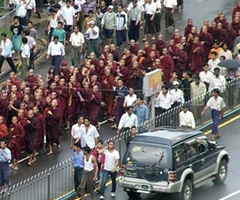
|
|
|
Home Asia Pacific South East Asia Myanmar Myanmar Protest News The monk's tale: 'We cannot turn back'By Rosalind Russell, The Independent, October 1, 2007Rangoon, Burma -- "We cannot turn back now. Whether it takes a month, a year or more, we will not stop." With his russet-red robes pulled around his knees, rocking back and forth on a low, wooden stool, the senior monk spoke quietly but determinedly.
But in the now-tranquil, tree-filled courtyard in central Rangoon, it is not of these atrocities that the monk, in his early sixties and wishing to remain anonymous, wants to speak. It is the atrocities which the Burmese people have suffered. The people are living under rulers busy enriching themselves with natural gas, timber, diamonds and rubies while spending less on health care per head than nearly any other country on earth. They are living in poverty more akin to sub-Saharan Africa than Asia.
Inside the monastery, for now untouched by soldiers, a group of monks are gathered around a television, apparently glued to a gymnastics display. But on closer examination, the soundtrack is not a sporting commentary about back-flips and balance beam routines; it is in fact the Democratic Voice of Burma, broadcasting reports from exiled journalists in Oslo, Norway. In this way, the monks can monitor the current backlash against the junta and how the world is – or is not – responding but can quickly flick the covert soundtrack off should the military's prying eyes come calling. Some of the monks are taking refuge in this temple now that their own temples have been blanketed in coils of barbed wire and sealed off from prayer. These precious religious sites now have the air of military camps. Gone is the scent of incense burning in worship, now it is the smell of stale cigarette butts, discarded by soldiers at the temple entrance. Tin Shwe Maung (not his real name), a monk in his early twenties, recalled the moment that soldiers stormed into the gleaming Shwedagon Pagoda on Thursday. The government admits to a death toll of nine that day, but Western diplomats put it much higher. "I was sitting with about 30 monks on the ground, praying at the place of the old brass Buddha. The police appeared very suddenly. There were definitely over 100, perhaps as many as 200. Carrying riot shields, truncheons and bayoneted rifles, they spread across the compound in front of us, some beating their shields, others aiming their guns," the young monk said. "Without any sort of warning, they charged at us, firing over our heads with real bullets. Some of us got up and ran but they caught many monks and beat them with their truncheons and rifle butts. One monk they beat very badly, smashing his head. He was only 15 years old, he had just joined the monastery." Another raid came after midnight, and more monks were carted off in police vans. "They are not in the normal prisons but in military and police camps. We hear that they are barely feeding the monks, nor are they allowing them contact with the outside," Tin Shwe continued. "I became a monk because of my love for peace and my love for Buddha. My heart is so full of sadness." |
 Get your Korean Buddhist News here, brought to you by BTN-Buddhist Channel |
 |
 The Mandala app brings together Buddhist wisdom and meditation techniques with the latest insights of psychology and neuroscience to handle the challenges and complexities of modern life. The App offers a series of engaging talks and conversations with experts on a wide variety of topics, such as managing stress, dealing with adversity, developing greater resilience, cultivating empathy and compassion, creating healthy relationships, and many more. These topics are explored to help find greater peace, meaning and joy in our lives. Our panel of experts include Dr, Thupten Jinpa, Daniel Goleman, Kelly McGonigal and others.FREE DOWNLOAD here |
| Point
your feed reader to this location |
| Submit an Article |
| Write to the Editor |

 Over the past few days, the monk has seen many of his fellow Buddhists rounded up and carted away as Burma's military regime brutally cracked down on anti-government protests, trying to suck any oxygen away from the flame of revolt. Pools of blood stain monastery doorways, memories linger of monks as young as 15 being clobbered over the head with truncheons and rifle butts.
Over the past few days, the monk has seen many of his fellow Buddhists rounded up and carted away as Burma's military regime brutally cracked down on anti-government protests, trying to suck any oxygen away from the flame of revolt. Pools of blood stain monastery doorways, memories linger of monks as young as 15 being clobbered over the head with truncheons and rifle butts.